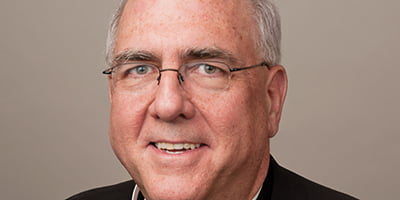by Archbishop Joseph F. Naumann
To apply basketball terminology, the full-court press is on in an effort to influence the Supreme Court to redefine marriage much in the same way that the court in 1973 invented a legal rationale to allow a mother to authorize the killing of her unborn child. The 1973 abortion decisions by the court ignored the best science of the time, which affirmed the humanity of the unborn child, in order to accommodate what was perceived as a growing societal acceptance of legal- ized abortion.
The disastrous abortion decisions of 40 years ago have resulted in the killing of more than 50 million American children, the emotional and spiritual scarring of more than 50 million parents, and the polarization of our nation. If you are wearied by how the abortion issue continues to divide deeply our nation, then you should be praying that the court does not repeat its autocratic behavior of four decades ago by attempting to cut short the public debate on such a fundamental moral issue as the definition of marriage.
Those who are so eager to push our nation over yet another ethical cliff are the faithful remnants of the true believers in the so- called “sexual revolution,” which gave us the current cultural, moral chaos resulting in more than a million abortions each year and an alarming percentage of American children born out of wedlock with single parenting as the new normal, particularly for the poor.
At the same time, there are some positive develop- ments in American culture that are contributing to the public policy debate regarding the definition of marriage. Actually, the support by many Americans for so-called same-sex marriage emanates from a quite commendable, though misdirected, compassion for those who experience same- sex attraction. Some reading this article experience or have experienced same-sex attractions and all of us know a relative, neighbor, co-worker or friend who has a homosexual orientation.
One of the positive results of the drumbeat in the popular culture to normalize the perception of homosexual activity has been to reduce the ridicule of individuals experiencing same-sex attractions. In our Catholic understanding, every human person is made in the divine image and every human being is of such inestimable worth that Jesus gave his life on Calvary. Our innate human dignity is in no way diminished by our sexual orientation.
The Catechism of the Catholic Church is crystal clear on this matter. It states: “The number of men and women who have deep-seated homosexual tendencies is not negligible. They do not choose their homosexual condition; for most of them it is a trial. They must be accepted with respect, compassion, and sensitivity. Every sign of unjust discrimination in their regard should be avoided. These persons are called to fulfill God’s will in their lives and, if they are Christians, to unite to the sacrifice of the Lord’s Cross the difficulties they may encounter from their condi- tion” (No. 2358).
Most of those sympathetic to the legalization of so-called same-sex marriage are motivated by a desire for happiness for those experiencing a same-sex attraction. We all need to love and be loved. Most Americans want those who experience same- sex attractions to experience the joy of friendship and love. Frankly, so do I.
Yet, the desire for those with a homosexual orientation to experience love and friendship will not be served by redefining marriage. It will mislead individuals with same-sex attractions to believe the prevalent cultural lie that love and genital sexual activity are identical. It will encourage same-sex couples to go down a path that is actually harmful to their physical, emotional and, most especially, their spiritual good. The legal recognition of so-called same-sex marriage will also further undermine and weaken family life in the United States.
I realize by merely questioning the advisability of redefining marriage that I will be branded by some as a bigot and a homophobe. This is part of the bullying and intimidation that is being used to silence critics of same- sex marriage, an example of which appeared as the lead item at the top of the editorial page for the Easter edition of The Kansas City Star.
One of the Star’s regular editorial ocntribution labeled as “bigots” Kansas Gov. Sam Brownback, in particular, and anyone else who upheld the definition of marriage as it has been understood for millennia by a wide variety of cultures and civilizations. Amazingly, under the banner of tolerance, there is an orchestrated effort to shout down and silence anyone who dares to question the societal wisdom of abandoning the definition of marriage that has been a foundation for strong and healthy fami- lies for millennia.
Similarly, good science is being suppressed as illustrated by the firestorm of criticism directed last summer at the New Family Structures Study conducted by University of Texas sociologist Mark Regnerus. Although it is perfectly normal academic sport to critique a study’s methodology, the shrill critics of the New Family Structure Study called for the University of Texas to discipline Regnerus. Why? Not because the methodology was flawed, but because the study’s findings challenged the prevailing cultural assumptions about the impact upon children raised by same-sex partners serving as parents. The efforts to punish professor Regnerus for his findings were in part to send a message to other researchers of what they can expect if their conclusions are not politically correct.
Why is this debate so important and so intense? The understanding of marriage is pivotal to the family and the well-being of children. Children have a desire and right to be connected to their biological parents. The principal reason the state should care about marriage is because of its importance for the formation and rearing of its future citizens. I will be devoting the next couple of columns to examining this crucial cultural and moral issue. Stay tuned.


